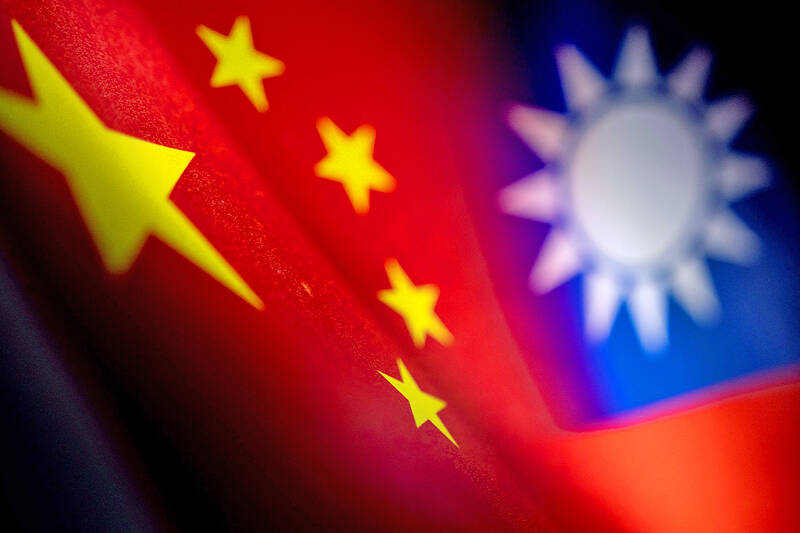Interest among the Chinese public in the issue of China’s unification with Taiwan is low, researchers said, citing the results of a poll.
An article titled “Assessing Public Support for (Non-)Peaceful Unification with Taiwan: Evidence from a Nationwide Survey in China,” published in the Journal of Contemporary China on May 14, showed that only 55 percent of those surveyed in China would support the use of military force to achieve unification with Taiwan.
In the survey, which polled 1,824 people on the question of how they would like to see the issue of Taiwan’s unification with China resolved, “only one out of one hundred rejected all but the most extreme option of wutong (武統, unification through military force),” the researchers wrote.

Photo: Reuters
The survey presented respondents with five options regarding Taiwan: to achieve unification through military force; to invade Kinmen and Lienchiang counties and force Taiwan to surrender; to use economic sanctions to force negotiations; to maintain the “status quo” and strengthen China’s national power to encourage Taiwan to voluntarily seek unification; or to allow Taiwan to choose its own path, including independence.
Support for most options was nearly equal, except for the option that included Taiwan’s independence, which 22 percent supported.
University of Miami political science researcher June Teufel Dreyer commented on the results during a Radio Free Asia program on Monday.
“This obviously does not support [Chinese President] Xi Jinping’s (習近平) statement that ‘the whole country is eagerly looking forward to the return of Taiwan,’” she said.
RAND Corp Hu Taiwan Policy Initiative director Raymond Kuo (郭泓均) also commented on the survey, saying that support in China for the use of military force against Taiwan might be even lower than what the survey reflects.
Based on research on the level of self-censorship practiced by Chinese when taking polls, the actual percentage of those who support military force might be closer to 25 percent, he said.
Chinese would also be influenced by a number of other factors, including China’s human rights situation, political factors and the possibility of US involvement in a conflict in the Taiwan Strait, he said.
National University of Singapore researcher Adam Liu (劉遙), who is one of the coauthors of the article, said that China’s rhetoric on Taiwan had toughened in comparison with when former Chinese presidents Hu Jintao (胡錦濤) and Wen Jiabao (溫家寶) were in power, which might be attributed to US-China tensions or to the administration of President Tsai Ing-wen (蔡英文), but Chinese would likely accept their government having a softer stance toward Taiwan.

INVESTIGATION: The case is the latest instance of a DPP figure being implicated in an espionage network accused of allegedly leaking information to Chinese intelligence Democratic Progressive Party (DPP) member Ho Jen-chieh (何仁傑) was detained and held incommunicado yesterday on suspicion of spying for China during his tenure as assistant to then-minister of foreign affairs Joseph Wu (吳釗燮). The Taipei District Prosecutors’ Office said Ho was implicated during its investigation into alleged spying activities by former Presidential Office consultant Wu Shang-yu (吳尚雨). Prosecutors said there is reason to believe Ho breached the National Security Act (國家安全法) by leaking classified Ministry of Foreign Affairs information to Chinese intelligence. Following interrogation, prosecutors petitioned the Taipei District Court to detain Ho, citing concerns over potential collusion or tampering of evidence. The

NEGOTIATIONS: Taiwan has good relations with Washington and the outlook for the negotiations looks promising, Minister of Economic Affairs J.W. Kuo said Taiwan’s GDP growth this year is expected to decrease by 0.43 to 1.61 percentage points due to the effects of US tariffs, National Development Council (NDC) Minister Paul Liu (劉鏡清) said at a meeting of the legislature’s Economics Committee in Taipei yesterday, citing a preliminary estimate by a private research institution. Taiwan’s economy would be significantly affected by the 32 percent “reciprocal” tariffs slapped by the US, which took effect yesterday, Liu said, adding that GDP growth could fall below 3 percent and potentially even dip below 2 percent to 1.53 percent this year. The council has commissioned another institution

TRADE: The premier pledged safeguards on ‘Made in Taiwan’ labeling, anti-dumping measures and stricter export controls to strengthen its position in trade talks Products labeled “made in Taiwan” must be genuinely made in Taiwan, Premier Cho Jung-tai (卓榮泰) said yesterday, vowing to enforce strict safeguards against “origin laundering” and initiate anti-dumping investigations to prevent China dumping its products in Taiwan. Cho made the remarks in a discussion session with representatives from industries in Kaohsiung. In response to the US government’s recent announcement of “reciprocal” tariffs on its trading partners, President William Lai (賴清德) and Cho last week began a series of consultations with industry leaders nationwide to gather feedback and address concerns. Taiwanese and US officials held a videoconference on Friday evening to discuss the

NEGOTIATIONS: The US response to the countermeasures and plans Taiwan presented has been positive, including boosting procurement and investment, the president said Taiwan is included in the first group for trade negotiations with the US, President William Lai (賴清德) said yesterday, as he seeks to shield Taiwanese exporters from a 32 percent tariff. In Washington, US Trade Representative Jamieson Greer said in an interview on Fox News on Thursday that he would speak to his Taiwanese and Israeli counterparts yesterday about tariffs after holding a long discussion with the Vietnamese earlier. US President Donald Trump on Wednesday postponed punishing levies on multiple trade partners, including Taiwan, for three months after trillions of US dollars were wiped off global markets. He has maintained a 10 percent